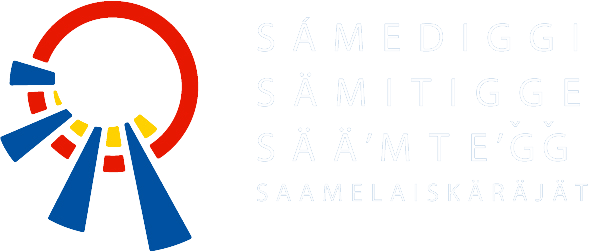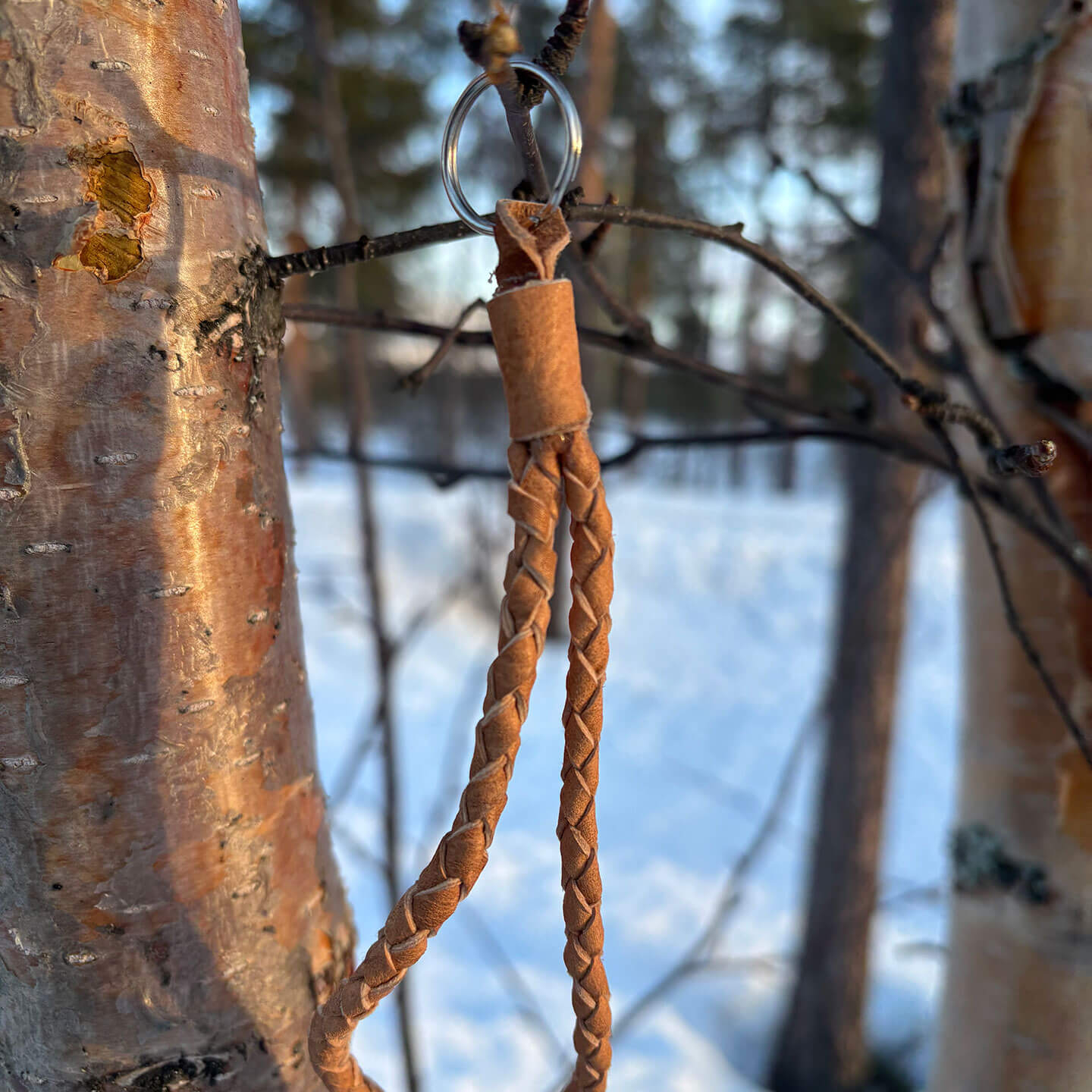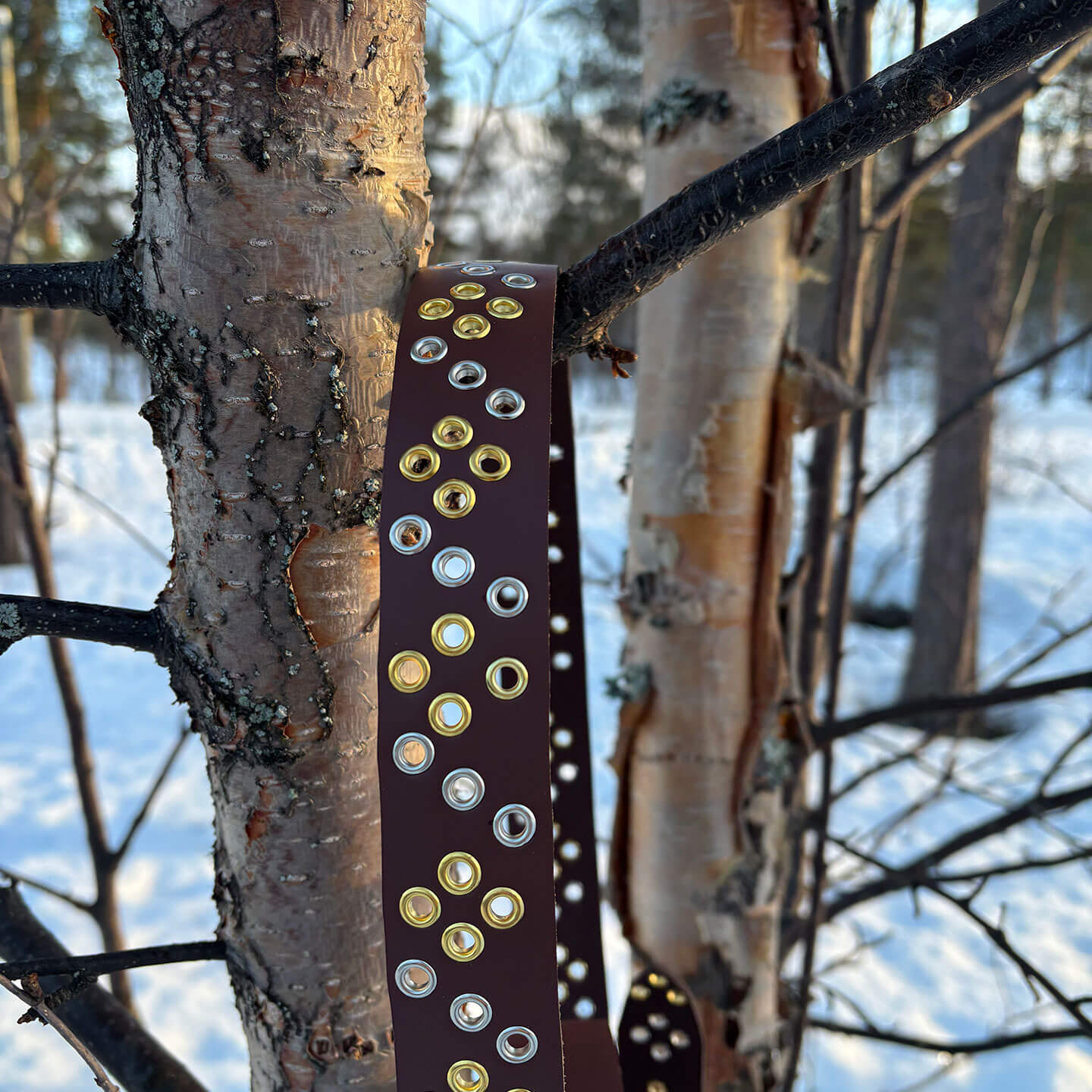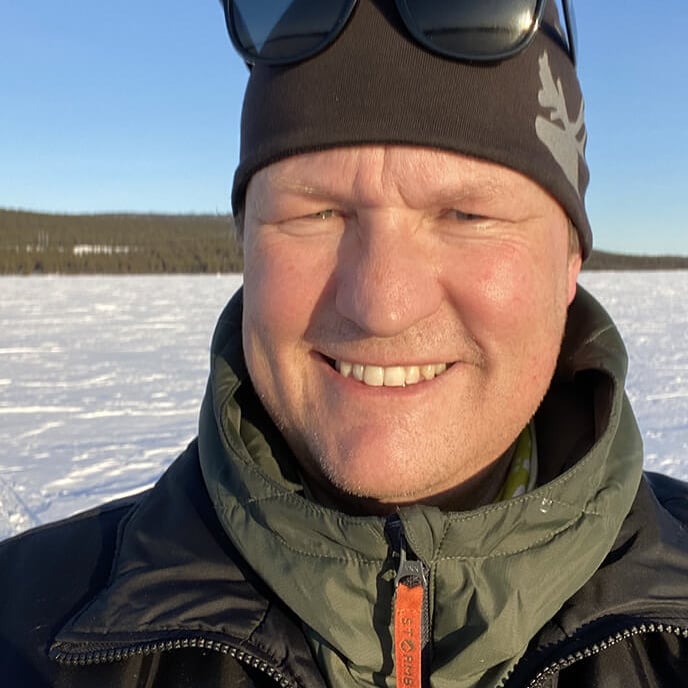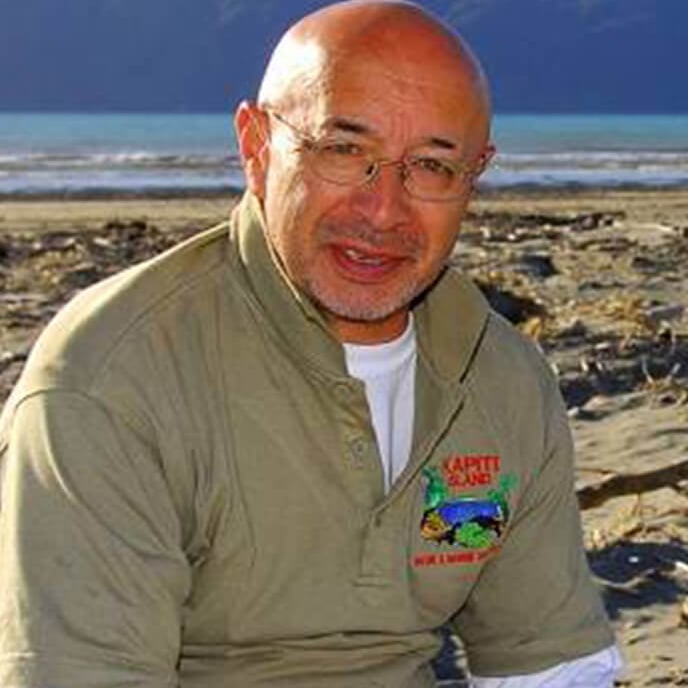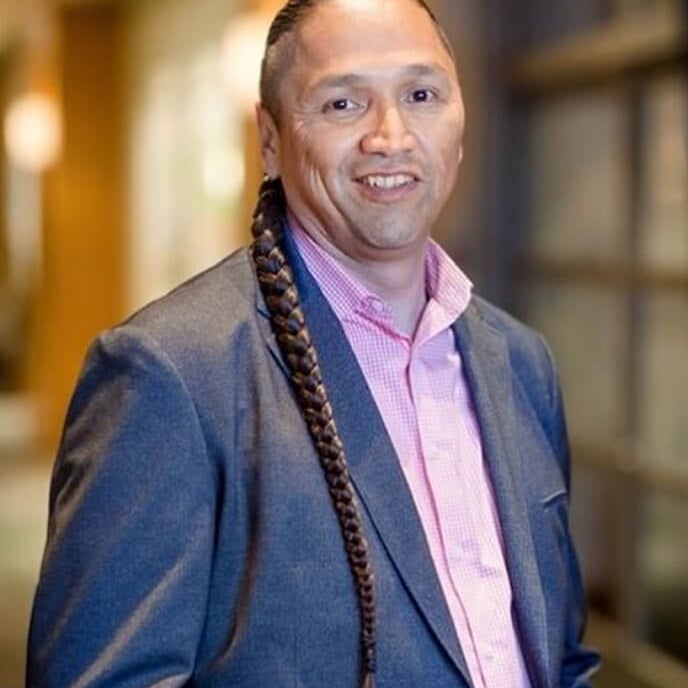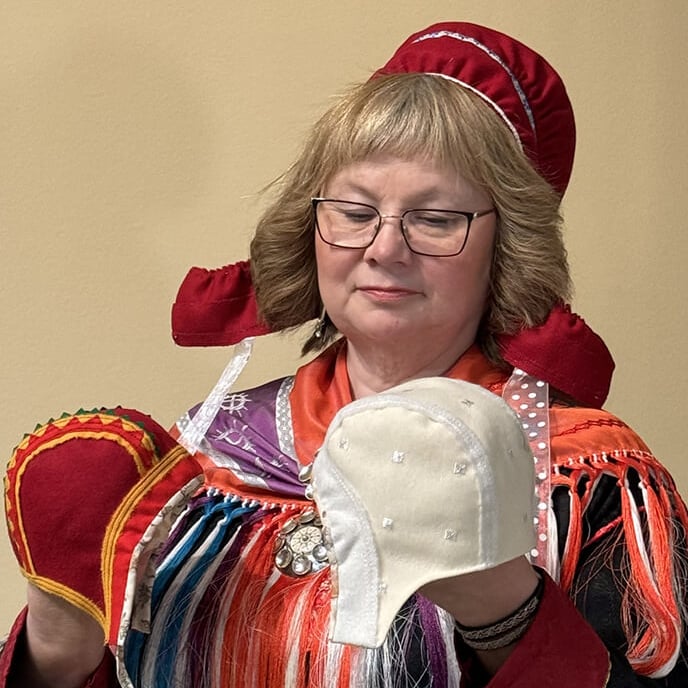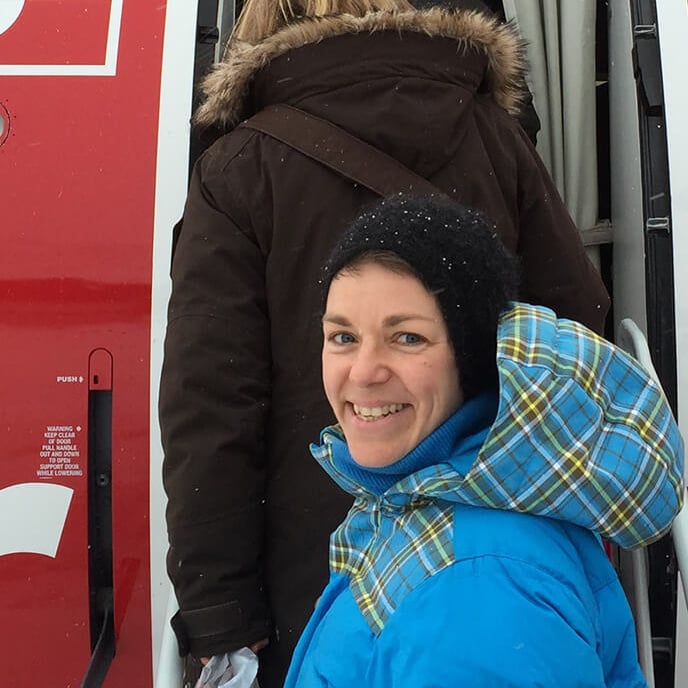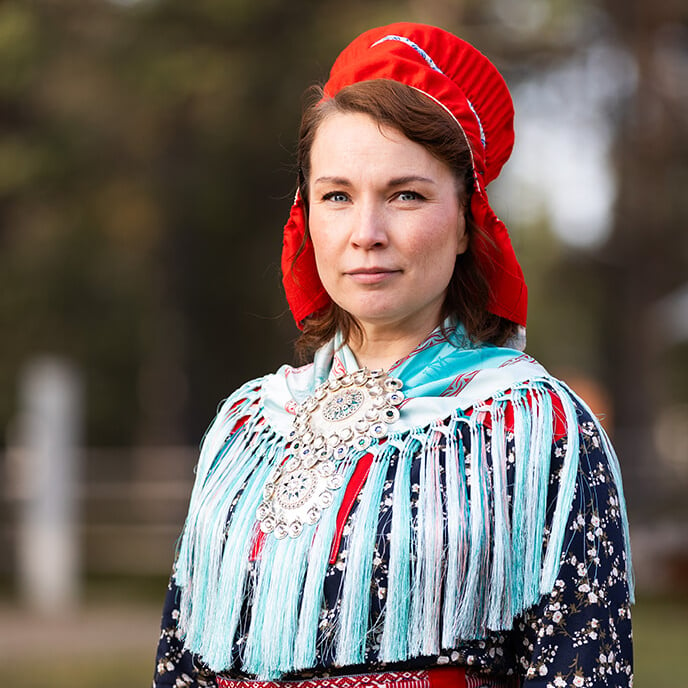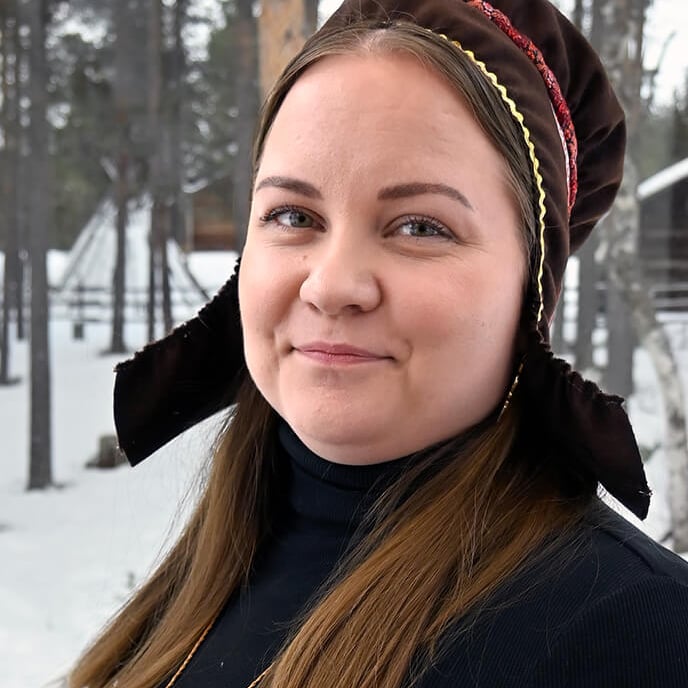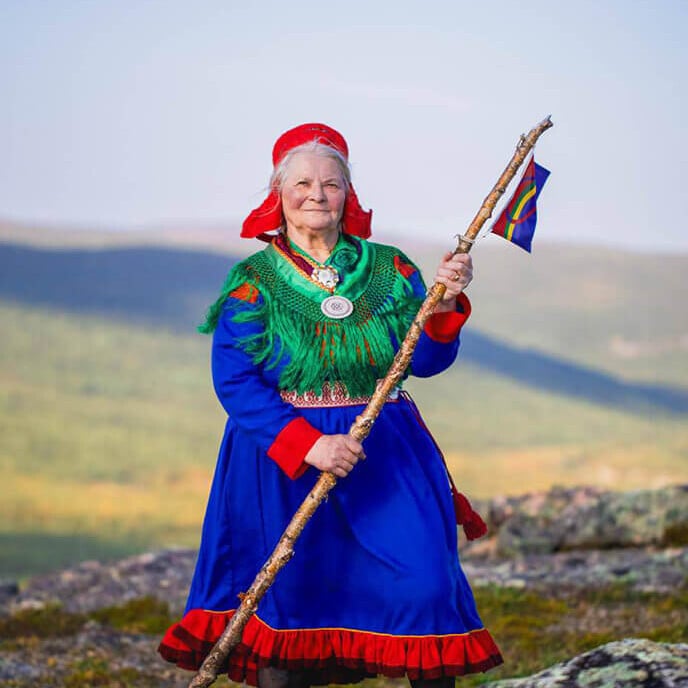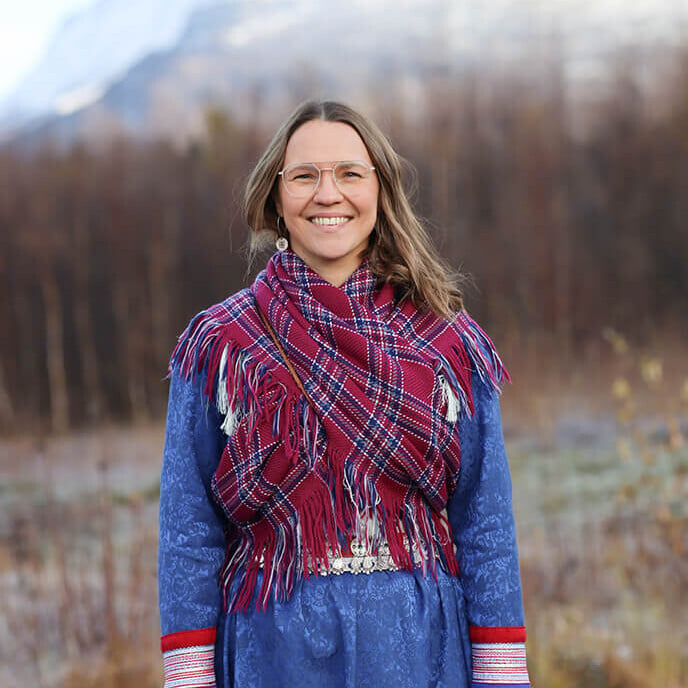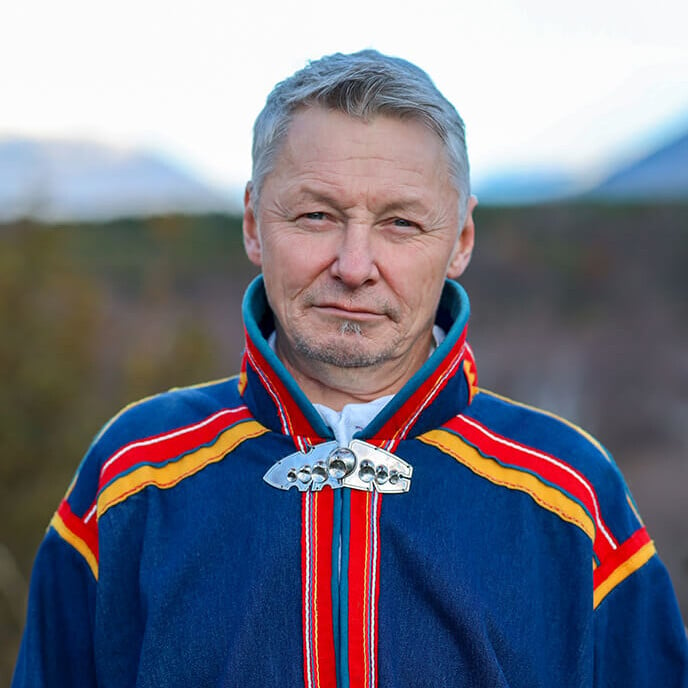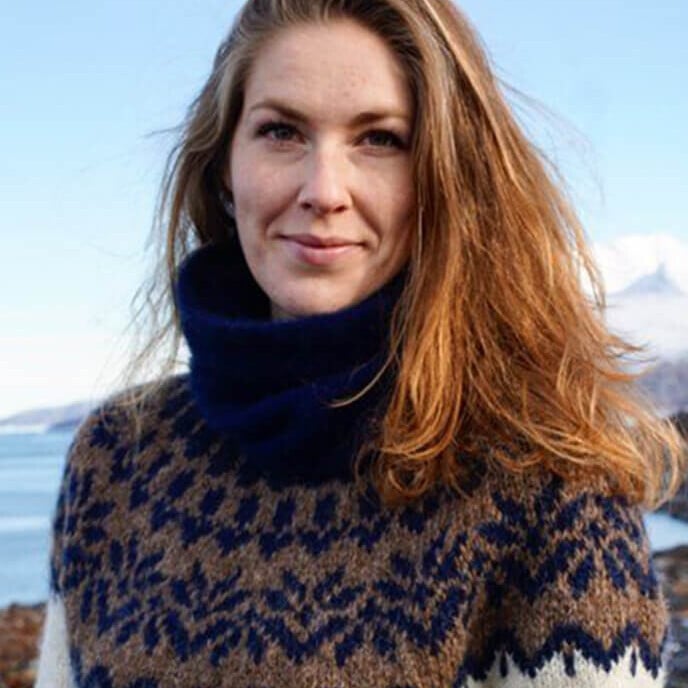European Indigenous Tourism Conference EITC 2025
The European Indigenous Tourism Conference EITC 2025 was held in Inari 20-22 May 2025. From below, you can listen to the conference recordings, which include those speakers’ presentations who have given permission for their presentations to be publicly shared. The presentations are in the original languages. The recordings have subtitles in English.
Link to the conference recording, 21 May 2025, subtitles in English.
Description: The recording features Chief Frank Antoine, Lennart Pittja, John Barrett, Silje Karine Muotka, Christina Hætta, Kirsi Suomi, Sébastien Desnoyers-Picard, Aviaja Jensen, Emma Krupula, Ann-Kristine Bongo and Monika Lüthje. The moderator is Suvi West.
Link to the conference recording, 22 May 2025, subtitles in English.
Description: The recording features John Barrett, Ellinor Guttorm Utsi, Taija Aikio, Carina Ren, Chief Frank Antoine, Sébastien Desnoyers-Picard, Stine Selmer and Ann-Kristine Bongo. The moderator is Suvi West.
Download here a poster-that summarises the main points of sustainable tourism on Indigenous lands based on the EITC 2025 presentations.
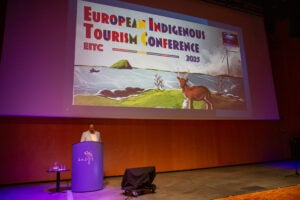
Welcome to the European Indigenous Tourism Conference EITC 2025!
Welcome to the European Indigenous Tourism Conference EITC 2025!
The World Indigenous Tourism Alliance (WINTA), together with the Sámi Parliament in Finland and University of Lapland cordially invite you to the European Indigenous Tourism Conference EITC 2025 to be held 20-22 May 2025 in Inari, Finland, and online.
EITC 2025 focuses on ethically sustainable Indigenous tourism. The organisers warmly welcome all interested in the topic, particularly Indigenous tourism entrepreneurs and stakeholders from Sápmi, Greenland and elsewhere in the world, as well as other related representatives from the tourism sector and researchers from different fields of Indigenous research.
An Indigenous Tourism Research Symposium will be organised as a component of the Conference on 20 May 2025. On 21 and 22 May, the programme will focus on the practice of ethically sustainable Indigenous tourism.
The conference will have simultaneous interpretation in English, Finnish, Inari Sámi, North Sámi and Skolt Sámi with the exception of the research symposium which will be in English only.
Conference registration takes place here. For online participants, there is no registration fee. For onsite participants, there is a fee to cover the costs of meals. The onsite participants also pay their own travel and accommodation costs. Information on available accommodation options can be found on the registration page.
The Finnish Ministry of Education and Culture has granted funding for the conference arrangements.
Contact person:
Monika Lüthje, University of Lapland, tel. +358-40-484 4198,
Indigenous Tourism Research Symposium
The World Indigenous Tourism Alliance, together with the Sámi Parliament in Finland and University of Lapland cordially invite you to the Indigenous Tourism Research Symposium to be held on 20 May 2025 in Inari, Finland, and online as a component of the European Indigenous Tourism Conference EITC 2025.
The Organising Committee invites the submission of abstracts for the Research Symposium. We welcome original research work conducted from diverse disciplinary perspectives including tourism and Indigenous research, the wider field of social sciences, economics and law. In addition to academic papers, we encourage grassroots Indigenous communities to submit presentations based on their lived experiences and worldviews. We give priority to presentations based on Indigenous ways of presentation conveying knowledge (e.g., storytelling, vocal music) and presentations that can serve as an empowering source of inspiration for Indigenous communities and tourism entrepreneurs.
Theme and Topics of Interest
The theme of the Research Symposium is tourism and Indigenous cultural heritage. The relations and connections between tourism and Indigenous cultural heritage, and accusations of appropriation, appreciation and excessive restrictions have been eagerly discussed topics. When tourism is Indigenous-led or developed in a respectful partnership with Indigenous local communities, it can play a crucial role in cultural preservation and revitalisation, providing opportunities for Indigenous entrepreneurs and communities. Indigenous tourism can contribute to the economic strength of Indigenous communities by creating jobs and income for traditional knowledge holders and create an opportunity for the young generation to learn and become skilled guides, storytellers, handcrafters and entrepreneurs. For this to happen, Indigenous tourism needs to be embedded within the community from where knowledge is provided. Indigenous people also need to tell their own story in tourism contexts.
Indigenous peoples and research have been criticising the exploitation of Indigenous cultural heritage in tourism for quite some time. Discussions on the detrimental impact of tourism on Indigenous peoples and on cultural appropriation have in recent decades spread to the awareness of the general public. As a result of this, the cultural appropriation and exploitation of Indigenous cultural heritage may have gained more subtle and hidden forms, not only in tourism but also more widely in business and popular culture. Indigenous washing – comparable to green washing – is a new phenomenon that is so far little researched in relation to tourism or other businesses, or with regard to its wider societal impacts.
Green washing is also a pertinent issue in tourism taking place on Indigenous lands. It makes tourism businesses look sustainable, thus masking its destructive impacts on the natural and cultural environment. The green washers are assumed to be responsible, sustainable companies, and this assumption may be extended to the ways in which Indigenous peoples and cultures are treated in the companies. The ongoing climate crisis and the accompanying green transition with its injustices are further threats to Indigenous cultural heritage. For example, in Sápmi (Sámiland), the construction of windmills threatens reindeer herding that is already suffering from land grabbing, mining, large-scale logging and other competing forms of land use, including tourism. Ecolabels and sustainable tourism certifications may hide these and other kinds of injustices. At the same time, Indigenous peoples aim to have a stronger hold on tourism by creating Indigenous codes of ethics and certifications for tourism. Tourism and Indigenous peoples may also have common interests regarding nature protection. Arctic tourism does not flourish without a well-being environment.
Tourism utilises cultural heritage in multiple ways. Museums which, according to their definition, conserve, store and represent cultural heritage, are among the most well-known tourism destinations. In addition to national cultural heritage, a lot of Indigenous peoples’ cultural heritage has been collected into them. The ownership, management and representation of Indigenous heritage has been discussed both within the museum field and with Indigenous peoples already for several decades. Nowadays, Indigenous peoples’ right to their cultural heritage is recognised increasingly widely. The repatriation projects that have started as a result of this have generated wider calls for the decolonisation of the cultural heritage field as well as efforts where the repatriation has paved its way to a wider community-based control and redefinition of cultural heritage based on Indigenous worlds and conditions. Indigenous-based redefinition of the museum is a worldwide phenomenon where the purposes of the museum are reconsidered. The development of alternative community-based models – decolonisation and Indigenisation – is also an emerging topic of discussion in the tourism sector, including tourism research, with the aim to build a more just society, economy and knowledge production. So far, the relations of Indigenous museums and tourism have, however, barely been researched.
The intersection of tourism, Indigenous cultural heritage and the following are topics of interest:
- responsibility, sustainability and justice
- climate change and loss of biodiversity
- cultural appropriation
- colonialism, decolonisation and Indigenisation
- codes of ethics, certifications
- Indigenous museums
- contemporary Indigenous cultural production and cultural revitalisation
- reconciliation
- Indigenous community participation
- Indigenous entrepreneurship and business development
- Indigenous ontologies, epistemologies and methodologies
Academic Research Abstracts and Community Project Abstracts
We strongly encourage Indigenous and non-Indigenous researchers and Indigenous community presenters to submit abstracts.
For academic researchers, abstracts are invited with a word limit of 400 (excluding references). Submissions must be original and in English.
The abstract should include:
- a title
- three to five keywords
- a brief outline of the background, methods, results and conclusions
- a summary statement of significance of the work to the symposium theme.
For Indigenous community presentations, an abstract in English of no more than 500 words is invited addressing a community project’s:
- title
- three to five keywords
- brief outline of the background to the project, the community population where the project is being conducted, how it was done, the results and conclusions for the future
- a summary statement of the significance of the project to the symposium theme.
Academic Research Abstracts and Community Project Abstracts should be submitted as a Microsoft Word document and include nomination for either the academic or the community presentation category and full contact details for the author(s), including their:
- name(s);
- Indigenous affiliation(s) if any,
- organisational affiliation(s)
- email address(es).
It is the submitter’s responsibility to ensure that all spelling and grammar has been checked and is correct. At least one of the named authors must attend the symposium on-site or online for the paper to be accepted in the final program.
To submit your abstract, please email the abstract to:
The symposium language will be English.
Review Process
Each abstract submitted will be subject to a peer review process. Reviewers will evaluate abstracts and make recommendations to the Organising Committee for selection. The Organising Committee will make a decision on whether particular abstracts will be accepted, revised or rejected. The decisions of the Organising Committee are final.
Outputs
Academic and Community Abstracts accepted and presented in the Indigenous Tourism Research Symposium will remain the copyright of the authors. An Abstract Book will be published in pdf format on the conference website prior to the symposium.
After the symposium, opportunity will be available to academic authors for their papers to be published in a special issue in an international high-quality academic journal. Papers submitted for the special issue will go through the normal peer-review process of the journal and, therefore, the Organising Committee cannot guarantee their publication.
Selected Community Projects will be offered the opportunity to publish a summary of their project in a conference report that will be published open access in the TemaNord publication series online after the conference. The publication will be produced by the Sustainable Indigenous Tourism in the Nordic Arctic project <linkki projektin sivulle, kun se on saatu valmiiksi> funded by the Nordic Council of Ministers’ Arctic Cooperation Programme and related to the conference.
Registration
Registration takes place here. For online participants, there is no registration fee. For onsite participants, there is a fee to cover lunch and coffee costs. The onsite participants also pay their own travel and accommodation costs. Information on available accommodation options can be found on the registration page.
Important Dates
30 November 2024: Call for abstracts closes
15 January 2025: Notification to authors of Organising Committee decision on their abstracts
31 January 2025: Final date for authors to confirm their agreement to present their paper
20 May 2025: Authors to present their paper at Indigenous Tourism Research Symposium
The symposium is funded by the Finnish Ministry of Education and Culture.
Registration
Event is organized as hybrid, participation is possible both onsite in Inari as well as online. The onsite conference venue is the Sámi cultural centre Sajos. Maximum number of onsite participants is 200. All participants, guests and speakers must register for the conference. There is no registration fee but organizers are collecting fees for catering (coffees and lunches marked in the programme). Catering fees have to be paid in advance. Lunch is available in three restaurants, Sajos, Siida and Wilderness Juutua.
The registration is open for on-site participants until 11 May and for online participants 22 May.
Please register for the conference as well as for social programme by using this online registration form.
The conference catering fees are:
- Coffees and lunch in Sajos: 26 €/day
- Coffees and lunch in Siida: 29 €/day
- Coffees and lunch in Wilderness Juutua: 32 €/day
- Dinner on Tuesday 20 May: 51 €
- Dinner on Wednesday 21 May: 77 €
- Dinner on Thursday 22 May: 51 €
Airport transfers
Organizers have arranged private bus transfers for conference participants for these flights:
- Mon 19 May, flight Helsinki – Ivalo at 19:55-21:30
- Tue 20 May, flight Helsinki – Ivalo at 7:40-9:55
- Tue 20 May, flight Helsinki – Ivalo at 20:15-21:50
- Fri 23 May, flight Ivalo – Helsinki at 22:10-23:45
Price is 20 €/way, please register in advance via registration form.
Payments
The catering fees include the VAT 0%. Please note that all payments must be made in advance and in euros (€).
Please choose your payment type on the online registration form. The options are
- Online bank transfer (Finnish banks)
- MobilePay
- Online credit card payment (Visa, MasterCard, EuroCard, Amex)
- Invoice
Invoice will be sent to you separately by the conference office. Please remember to
specify the invoicing address on the registration form. Invoicing fee 10 € will be added to all
invoices. You can request for group invoice by sending email to congress office
().
Cancellation terms
Cancellations must be made by email to Rovaniemi-Lapland Congresses (). Dinner fees will be refunded if the cancellation is received by 14 April 2025 and lunch and coffee fees if the cancellation is received by 5 May 2025. No refunds will be made for cancellations received after these dates. Please note that a processing fee of 20 € will be deducted from all refunds. Transferring registration to another participant is free of charge.
Accommodation
The conference organizers have made bulk reservations for the conference guests in five hotels and two holiday villages in Inari and Ivalo. Booking directly from the hotels.
Wilderness Hotel Juutua (distance 300 m from Sajos)
- Wilderness Room single 129 eur/night
- Wilderness Room double 139 eur/night
- Arctic Room single 149 eur/night
- Arctic Room double 159 eur/night
- Juutua Suite single 154 eur/night
- Juutua Suite double 164 eur/night
Hotel quota is valid until 31 March. Prices include breakfast. Bookings by email:
Please use the following code: EITC2025.
Terms of payment: Full deposit payment 14 days prior to arrival.
Terms of cancellation: No cancellation fee until 14 days prior to arrival. 100% cancellation fee less than 14 days prior to arrival.
Hotel Inari (distance 600 m from Sajos)
- Superior room single 100 eur/night
- Superior room double 120 eur/night
Prices include breakfast. Bookings via this page. Please use the following promo code: EITC2025.
Craw Creek Cabins (distance 700 m from Sajos)
- Craw Creek Cabin 75 eur/night, 1-2 persons
Price does not include breakfast. You can buy breakfast from Hotel Inari via booking form, price for breakfast is 10 €/person/day. Bookings via this page. Please use the following promo code: EITC2025.
Hotel Village Inari (distance 1.3 km from Sajos)
- Panorama Cabin 95 eur/night, 1-2 persons
- Inari Sauna Studio 120 eur/night, 1-2 persons
- Inari Sauna Suite 145 eur/night, 1-2 persons
- Aurora Cabin 150 eur/night, 1-2 persons
Price does not include breakfast. You can buy breakfast from Hotel Inari via booking form, price for breakfast is 10 €/person/day. Bookings via this page. Please use the following promo code: EITC2025.
Hotel Korpikartano (distance 33 km from Sajos)
- Single room 73 eur/night
- Twin room 98 eur/night
Prices include breakfast and one hour of private sauna daily. To make a reservation, please contact us by e-mail at Payment upon reservation by invoice, which is due in 7 days from receipt of invoice. Reservation is confirmed, when the customer has paid the value of the reservation by the due date. Free cancellation 30 days prior to arrival. The guests are recommended to have a travel insurance.
Hotel Ivalo (distance 40 km from Sajos)
- Standard single room 112 eur/night (not renovated yet)
- Standard twin room 135 eur/night (not renovated yet)
- Premium single room 135 eur/night
- Premium twin room 165 eur/night
Room prices include breakfast, evening sauna, use of swimming pool and wifi. Payment on spot within check-in. Reservations by email Cancellation can be made without charge until 16.5.2025.
Hotel Kultahippu (distance 39 km from Sajos)
Traditional Kultahippu (no elevator)
- Standard single room 84 eur/night
- Standard twin room 105 eur/night
Riverbank
- Deluxe single room 109 eur/night
- Deluxe twin room 143 eur/night
- Deluxe single room with sauna 133 eur/night
- Deluxe twin room with sauna 176 eur/night
Prices include breakfast, evening sauna, wifi and taxes. Booking via this page. You will get the event prices by giving code EITC2025 to the Promo/voucher code window Accommodation will be paid when booking and here are the cancellation terms:
- cancellation is possible until two days before arrival, full refund
- without cancellation in time or no show, payments are non-refundable
EITC programme
The Organizing Committee reserves the right to make changes to the programme.
All times are in Finnish time, UTC+3h, Eastern European Summer Time (EEST).
Tuesday 20.5.2025
Indigenous Tourism Research Symposium, Sajos’ Auditorium Dolla and online
| 08:30−09:00 | Registration |
| Chair of the morning sessions: Monika Lüthje | |
| 09:00−09:05 | Monika Lüthje: Tervetuloa |
| 09:05−09:45 | Áile Aikio: Keynote presentation: Čiktit firpmiid, čuoldit hearvvaid. Rethinking Museums. |
| 09:45−10:15 | Rune Magne Opdahl, Dorthe Eide and Anastasiya Henk: When indigenous culture experiences spur negative communication in SoMe: reasons for stereotypes and implications for Sámi tourism |
| 10:15−10:40 | Pascal Tremblay: The ambiguous interface between indigenous tourism and expanding ‘wellness tourism’ narratives: weighing market and product opportunities against cultural appropriation risksLink: SECTION 1: Understanding the business of wellness tourism |
| 10:40−11:05 | Eleonora Alariesto: Colonial land-use as contaminant in Sámi sacred cultural environments – the cases of Äijih and Rástigáisá |
| 11:05−11:30 | Coffee |
| 11:30−11:55 | Nina Smedseng: Co-creating tourism knowledge: relational ethics (accountability) and indigenous methodologies in Sámi tourism research |
| 11:55−12:20 | Ningning Sun, Maud A.J. van Soest ja Zoë Wright: Co-producing codes of ethics for visitors to indigenous communities: adapting research practices for responsible tourism in the European Arctic |
| 12:20−13:20 | Lunch |
| 13:20−14:05 | Break |
| 14:05−14:30 | Coffee |
| Chair of the afternoon session: Eleonora Alariesto | |
| 14:30−14:55 | Sonya Graci, Yvette Rasmussen ja Wendy Cukier: Indigenous entrepreneurship and social innovation in indigenous tourism development in Northern Canada |
| 14:55−15:20 | Herminia Din: Connecting culture, land and nature: reimaging a new model of northern tourism program |
| 15:20−15:30 | Eleonora Alariesto and Monika Lüthje: Conclusion |
The symposium language is English with no interpretation into other languages.
Downloadable documents
| Parallel to the symposium: | |
| 09:00−18:00 | Exhibition in Sajos’ lobby: Sámi comic artist Sunna Kitti’s illustrations for Responsible Tourism in Sámi Homeland – visitor guidance |
| 10:00−17:00 | Possibility to visit the Sámi Museum Siida, entrance fee EUR 12 per person (show your EITC name card at the entrance to get this price) |
| 10:00−17:00 | Sámi handicraft market in Sajos’ lobby: Sámi handicraft makers sell their products Organizer: Sámi Duodji association |
| 10:00−12:00 | Sámi handicraft workshop 1: Make yourself a Sámi belt Place: Silbanásti, Sajos Participation fee: EUR 25 per person (to be paid in the workshop) Registration: through the conference website Organizer: Sámi Duodji associationThe workshop languages are North Sámi, Finnish and English. |
| 13:30−15:30 | Sámi handicraft workshop 2: Make yourself a reindeer leather key chain Place: Silbanásti, Sajos Participation fee: EUR 13−16 per person (to be paid in the workshop) Registration: through the conference website Organizer: Sámi Duodji associationThe workshop languages are North Sámi, Finnish and English. |
| Modern and traditional Sámi cooking with traditional ingredients workshop, Sajos’ Auditorium Dolla and online |
|
| 16:15−18:15 | Sámi chef Heikki Nikula and traditional knowledge holder Maarit Länsman cook and give tastings
Moderator: Saara-Maria Salonen The workshop language is English with no interpretation into other languages. Special diets cannot be taken into account in the tastings. The main |
| Dinner | |
| 19:00−21:00 | Wilderness Hotel Juutua |
Wednesday 21.5.2025
Moderator: Suvi West
The language of the presentations will vary depending on the speaker. All presentations will be interpreted in five languages (English, Finnish, Inari Sámi, Northern Sámi, Skolt Sámi) to both on-site and online participants.
| 08:15−09:00 | Registration and coffee |
| Opening session | |
| 09:00−09:10 | Inari Sámi music by Anna Morottaja |
| 09:10−09:20 | Tuomas Aslak Juuso, Sámi Parliament in Finland: Welcoming words |
| 09:20−09:30 | Frank Antoine, Moccasin Trails and WINTA: Greetings from the World Indigenous Tourism Alliance |
| 09:30−09:40 | Silje Karine Muotka, Sámi Parliament in Norway: Greetings from the Sámi Parliament in Norway |
| 09:40−09:50 | Håkan Jonsson, Sámi Parliament in Sweden: Greetings from the Sámi Parliament in Sweden |
| 9:50−10:00 | Per Olof Nutti, Saami Council: Greetings from the Saami Council |
| 10:00–10:10 | Naaja H. Nathanielsen, Greenlandic Government: Video greetings from Kalaallit Nunaat/Greenland |
| 10:10–10:20 | Niila-Juhán Valkeapää, Sámi Youth Council: Greetings from the Sámi Youth Council |
| 10:20–10:30 | Inari Sámi music by Heli Aikio |
| 10:30–11:05 | Keynote from Sápmi: Suvi West: Asking for permission, asking for a story − a Sámi storyteller´s take on tourism and what to share |
| Certifications in Indigenous tourism | |
| 11:05−11:40 | Kirsi Suomi, Sámi Parliament in Finland: The upcoming Sámi tourism certification in Finland |
| 11:40−12:15 | Christina Hætta, Saami Council: The Sámi trademarks − a piece of Indigenous self-determination |
| 12:15−13:15 | Lunch |
| 13:15–14:00 | Sébastien Desnoyers-Picard, Indigenous Tourism Association of Canada: Experiences from the Original Original certification program in Canada |
| 14:00−14:30 | Lennart Pittja, Sápmi Nature and WINTA and Sébastien Desnoyers-Picard, Indigenous Tourism Association of Canada: How to assess the impacts of an Indigenous tourism certification? |
| 14:30−15:00 | Coffee |
| 15:00−15:45 | Frank Antoine, Moccasin Trails and WINTA: Indigenous certification |
| 15:45−16:45 | Panel of Indigenous tourism entrepreneurs: John Barrett, Kapiti Island Nature Tours and Nature Lodge, New Zealand; Ann-Kristine Bongo, Sami Siida, Norway; Mai Britt Eira, Arctic Urbi, Norway; Aviaja Holm Jensen, Great Greenland, Greenland; Emma Krupula, Emma’s Reindeer, Finland; and Heikki Paltto, Paltto Adventures, Finland; Moderator: Lennart Pittja, Sápmi Nature and WINTA |
| 16:45−16:50 | Suvi West: Short summary of the day |
| 16:50−19:00 | Break |
| 19:00−19:30 | Skolt Sámi music by Suõmmkar (on-site only) Suõmmkar is the first band in the world to combine old Skolt Sámi traditional music (leuʹdd, quadrille) with contemporary folk and pop influences. |
| Parallel to the conference sessions: | |
| 09:00−18:00 | Exhibition in Sajos’ lobby: Sámi comic artist Sunna Kitti’s illustrations for Responsible Tourism in Sámi Homeland – visitor guidance |
| 10:00−17:00 | Possibility to visit the Sámi Museum Siida, entrance fee EUR 12 per person (show your EITC name card at the entrance to get this price) |
| Sámi handicraft market in Sajos’ lobby: Sámi handicraft makers sell their products Organizer: Sámi Duodji association |
|
| 15:45−17:45 | Sámi handicraft workshop 4: Make yourself Sámi silver jewellery Place: Silbanásti, Sajos Participation fee: EUR 10 + the price of the silver used (to be paid in the workshop) Registration: through the conference website Organizer: Sámi Duodji associationThe workshop languages are North Sámi, Finnish and English. |
| Dinner | |
| 19:45−22:00 | Wilderness Hotel Juutua Northern and Inari Sámi rap music by Áilu Valle & Amoc |
Thursday 22.5.2025
Moderator: Suvi West
The language of the presentations will vary depending on the speaker. All presentations will be interpreted in five languages (English, Finnish, Inari Sámi, North Sámi, Skolt Sámi) to both on-site and online participants.
| 08:30−09:00 | Coffee |
| Sustainable Tourism | |
| 09:00−09:30 | John Barrett, Kapiti Island Nature Tours and Nature Lodge and WINTA: How our Maori family understands the meaning of sustainable |
| 09:30−10:00 | Ellinor Guttorm Utsi, Davvi Siida: Is the green transition sustainable from the Sámi livelihoods’ perspective? |
| 10:00−10:30 | Taija Aikio, Sámi Museum Siida: Culturally sustainable tourism through community work |
| 10:30−11:00 | Ulunnguaq Markussen, University of Greenland and Carina Ren, Aalborg University: A just destination? Exploring local hopes, fears, and power asymmetries in East Greenlandic (Tunu) tourism development |
| 11:00−11:35 | Panel of Indigenous tourism entrepreneurs: Sofianguak Kristiansen, Sermeq Pottery, Greenland; Risten Oskal, Cavzo Safari, Norja; and Heikki Paltto, Paltto Elämysretket/Adventures, Finland Moderator: Lennart Pittja, Sápmi Nature and WINTA |
| 11:35−12:35 | Lunch |
| Selling Indigenous tourism globally and locally | |
| 12:35−12:55 | Frank Antoine, Moccasin Trails and WINTA: Indigenous marketing |
| 12:55−13:15 | Sébastien Desnoyers-Picard, Indigenous Tourism Association of Canada: News from the new global marketing organization DO-IT (Destination Original Indigenous Tourism) |
| 13:15−13:45 | Stine Selmer, Sustine Consult: Greenland rundown |
| 13:45−14:45 | Introduction of Sámi and Inuit tourism companies: Ann-Kristine Bongo, Sami Siida, Norway; Mai Britt Eira, Arctic Urbi, Norway; Sofianguak Kristiansen, Sermeq Pottery, Greenland; Risten Oskal, Cavzo Safari, Norja; and Heikki Paltto, Paltto Elämysretket/Adventures, Finland |
| 14:45−15:15 | Coffee |
| 15:15−15:35 | Jaakko Leinonen, Finnish Safety and Chemicals Agency: The new consumer safety legislation from the perspective of tourism services |
| 15:35−15:55 | Stine Selmer, Sustine Consult: Green washing and the new EU green claims directive − effects on tourism |
| 15:55−16:00 | Suvi West: Concluding words |
| Modern Sámi cooking with traditional ingredients workshop, Sámi Education Institute | |
| 16:00−19:00 | Cooking workshop with the Sámi chef Heikki Nikula for a limited number of Indigenous tourism entrepreneurs
Participation fee: no fee The workshop language is Finnish. |
| Samanaikaisesti konferenssisessioiden kanssa: | |
| 09:00−17:00 | Exhibition in Sajos’ lobby: Sámi comic artist Sunna Kitti’s illustrations for Responsible Tourism in Sámi Homeland – visitor guidance |
| 10:00−17:00 | Possibility to visit the Sámi Museum Siida, entrance fee EUR 12 per person (show your EITC name card at the entrance to get this price) |
| Sámi handicraft market in Sajos’ lobby: Sámi handicraft makers sell their products Organizer: Sámi Duodji association |
|
| 10:00−12:00 | Sámi handicraft workshop 5: Make yourself a Sámi belt Place: Silbanásti, Sajos Participation fee: EUR 25 per person (to be paid in the workshop) Registration: through the conference website Organizer: Sámi Duodji associationThe workshop languages are North Sámi, Finnish and English. |
| 16:00−18:00 | Sámi handicraft workshop 6: Make yourself Sámi silver jewellery Place: Silbanásti, Sajos Participation fee: EUR 10 + the price of the silver used (to be paid in the workshop) Registration: through the conference website Organizer: Sámi Duodji associationThe workshop languages are North Sámi, Finnish and English. |
| Dinner | |
| 19:30−21:30 | Wilderness Hotel Juutua |
Speaker introductions
Suvi West
Suvi West is a river Sámi director and scriptwriter. West has made several award-winning document films that have been shown at significant film festivals and on European TV channels. Besides her artistic work, West has won awards for her influencer work, among other awards, the Pro Feminism Award (2022) and the Finnish State Award for Public Information (2022). In 2023, the Association of Finnish Film Directors selected Suvi West as the Director of the Year. West’s first novel Syntien kummun naiset [The Women of the Hill of Sins] (S&S) was published in Mai 2025. Most of West’s work is located in a river Sámi cultural environment. In her works, she addresses the impact of colonialism on an individual and dreams of a decolonial reality.
Sebastien Desnoyers Picard
Sebastien is an Indigenous leader from the Huron-Wendat First Nation in Quebec and a former elected chief in his community. With 20 years of experience under his belt, he is a driving force in Indigenous tourism, forging global partnerships and spearheading transformative initiatives that elevate Indigenous tourism on the world stage. As the President & CEO of Destination Original Indigenous Tourism, Sebastien orchestrates a groundbreaking collaboration between the Indigenous Tourism Association of Canada (ITAC), the American Indian Alaska Native Tourism Association (AIANTA), and New Zealand Māori Tourism. His tenure as ITAC’s Vice President and Chief Marketing Officer was marked by the creation of Destination Indigenous and the award-winning "The Original Original" marketing campaign, setting new benchmarks for excellence. A passionate advocate for Indigenous rights and culture, Sebastien’s work with global media has garnered prestigious accolades, including the Explore Canada Award of Excellence. Committed to advancing Indigenous tourism, he champions innovation, inclusion, and meaningful progress for Indigenous communities worldwide.
Lennart Pittja
Lennart Pittja, an indigenous Sámi from the Swedish side of Sápmi was born and raised in a reindeer herding family in Unna Tjerusj Sámi community and considers reindeer to be the most beautiful animal on the planet. Lennart has 30 years of experience in Sámi tourism. Founder of Sápmi Nature where guests from all over the world come to experience the Sámi way of life in a small-scale and sustainable way. Sápmi Nature Camp is located outside Gällivare and Jokkmokk in Sjávnjá Nature Reserve, part of the UNESCO Laponia World Heritage Area in Arctic Sweden. Sápmi Nature Camp was featured on the list “21 places to stay if you care about the planet” by National Geographic and was featured by AFAR as “one of 27 best new hotels in the world” a few years ago. Lennart has been awarded Best Swedish Ecotourism Company in Sweden twice, in 2004 and 2019, and was the candidate from Swedish Lapland Visitors Board to Stora Turismpriset 2019. Lennart Pittja was one of the project leaders for Visit Sápmi 2010 - 2014, he has worked with Nature’s Best for the national nature-based tourism organization Naturturismföretagen where he’s also been on the board for a number of years. Currently, Lennart Pittja is part of board at Swedish Lapland Visitors Board. Lennart Pittja has been sharing knowledge about Sámi tourism and indigenous values at conferences and meetings all over the world. In all parts of Sápmi (except the Kola Peninsula), in Europe, and the world. In March 2023 he presented at the World Indigenous Tourism Summit in Noongar Nation, Perth, Australia. Lennart is part of the Leadership Council of WINTA – World Indigenous Tourism Alliance. Lennart has two grown-up daughters. Lennart is living in Gällivare, on the Swedish side of Sápmi.
John Barrett
John Barrett is the Chairman and founder of Kapiti Island Nature Tours- and Nature Lodge, a Maori family operated, multi award winning tourism business, located on one of New Zealand’s premier nature/wildlife reserves – Kapiti Island. The business is strongly focused on developing whanau (family) hapu and Iwi (tribal group) members into tourism work that is meaningful financially, culturally, environmentally and socially. John has been engaged with the tourism sector through governance roles at regional, national and international levels–NZ Maori Tourism, and is a foundation member of the World Indigenous Tourism Alliance (WINTA) Leadership Council. John is active within his tribes- in the fields of economic development, higher education, cultural retention and environmental care and management. He has 40 + years of management and governance experience in a range of private and public organisations and enterprises.
Heikki Nikula
I was born in Inari. My family consists of my partner Anna-Leena Lahti and two young sons Martti and Juhháán. My father’s family lived in Inari Sámi natural economy. That is, their main livelihoods were fishing, hunting and reindeer herding. My mother was from the Ounasjoki River valley and moved to Inari in the 1960’s as a young woman to work as a hotel manager in the tourism hotel of Inari. Quite soon she met my farther. Thanks to my mother’s work, I have been used to visit restaurants and hotels since my childhood. My farther Reino taught me to fish, hunt, gather and everything that belongs to the Northern culture. The most important lesson learnt from him is respecting and appreciating nature. When you taste grayling that has been caught at the end of summer in the Juutuanjoki River and fried on its shore on embers, you understand why the food coming from the pure nature of Lapland is of top quality. Food will not be better anywhere in the world although you would garnish it with truffles and goose liver. After high school, I went to Rovaniemi to study at the restaurant school Oppipoika to become a cook because at some point I started to be interested in cooking. During the summers, I worked in my mother’s hotel and in 1994 I decided to start studying full-time pop-jazz music at the conservatoire in Joensuu. My North Karelian tour lasted ten years during which I worked as a horse farmer, restaurant owner, musician and educated myself into a chef at the restaurant school Perho in Helsinki. After the years spent in the South, the home village started to call me to come back and in 2003 I moved back to Inari and started to develop my mother’s hotel with my sister Kaisu. After my return, also the Inari Sámi culture and traditions of my farter’s family have started to interest me more and more. Together with my sister Kaisu Nikula, I was the entrepreneur of the hotel Inarin Kultahovi in 2001−2023 and our restaurant Aanaar was chosen as the restaurant of the year by the Finnish Gastronomic Society in 2020. I have worked as a cook in numerous TV shows (e.g. Loirinuotiolla, Burgerimies and Villen keittiössä). In the Sápmi Awards cooking contest, I won the shared second prize in 2014. I like to fish with fly and spoon and all nature experiences and the Northern annual cycle related to them are the most important reasons for me to live in Inari. I enjoy them daily. My nature relation in also visible in my food philosophy and untouched nature and the last old forests that one can still find in Inari are in my opinion important and worth preserving.
Frank Antoine
Chief Frank Antoine is from the Bonaparte First Nation which is part of the Shuswap Nation of the Interior Salish. He is also the co-founder of Moccasin Trails Inc. which is based out of Kamloops & Kelowna, B.C. His lifetime experiences and cultural practices have given him a platform to work on many levels within the tourism industry. “Wanting to grow Indigenous tourism is to learn how to trust and how to share our indigenous values in a respectful business format. If done right, tourism will educate our guests & visitors the authentic ways of our ancestors.” Frank sat on a variety of tourism boards in his province of British Columbia & Canada from grassroots, regional, provincial & national. He also currently sits on the World Indigenous Tourism Alliance. He is a sought-after presenter who is well-versed in a multitude of Indigenous topics including his own inspiring journey, relationship / partnership building, authentic Indigenous tourism development, Indigenous empowerment and much more. Frank is a strong cultural ambassador and proud to share the traditional values he carries today
Ellinor Guttorm Utsi
Nearly 60 years old, grandmother to 8. Raised up in a reindeerherders family, married with a reindeer herder, and we choose to have reindeer herding as our main income. Reindeer husbandry is a rough profession. We live with the reindeer and for the reindeer. We invite you to take a part in pure life by visting our Company Davvi Siida. (linkki: https://davvisiida.no/en/) Adventures in Sápmi. Be a guest in our lives, our traditions and our history, interlaced with that of the reindeer. Sami handicraft Duodji is an important part of my life.
Carina Ren
Carina Ren is an associate professor at Aalborg University, Denmark and Head of AAU Arctic, the Arctic platform at her university. Carina researches the relations between tourism development and Arctic sociality with a particular focus on Greenland. Recent and ongoing research projects focus on culturally sensitive tourism development, cruise communities in Greenland and Arctic tourism futures in the light of socio-environmental changes.
Áile Aikio
Áile Aikio (she/her) is a Sámi scholar and post-doctoral researcher at the University of Lapland, Finland. Her research interests include Sámi duodji and art, cultural heritage, decolonization and indigenization of heritage practices, and multispecies coexistence. She holds a Ph.D. in Social Sciences and an MA in Ethnology. Currently, she is contributing to the project “Sámi Political Traditions and Thought in Co-becoming with the Environment,” funded by the Academy of Finland. Her latest publications include her dissertation "Saamelainen museo? Tutkimus saamelaisen kulttuuriperinnön ontologisesta politiikasta" ['Sámi museum? A study on ontological politics of Sámi cultural heritage'] (2023) and the co-edited book "The Sámi world" (2022). Prior to her doctoral studies, Aikio worked as a Curator at the Sámi Museum Siida, where she deepened her expertise in Sámi cultural heritage and Sámi art.
Taija Aikio
Taija Aikio is the Audience Manager at Sámi Museum Siida in Anár, Sápmi. She has been part of Siida’s team for seven years, starting in customer service before moving into marketing and now leading the Audiences and Exhibitions team. As Inari Sámi, and with a background in Sámi culture studies from the Giellagas Institute at the University of Oulu she brings both a personal and professional perspective to indigenous culture and tourism. Siida was named European Museum of the Year 2024, particularly for its commitment to community engagement. At Siida, cultural sustainability isn’t just a principle—it’s the foundation of everything they do. Their work is always carried out in collaboration with Sámi communities, ensuring that indigenous voices are not only included but are actively shaping the way forward.
Stine Selmer Andersen
Stine Selmer is a passionate tourism specialist who has worked with sustainable development on business, destination, and industry level. She has obtaining knowledge and experience from both political, community and commercial point of views through her work as destination manager at Colourful Nuuk, Head of Sustainability at Visit Greenland and as the owner of the consultancy firm Sustine Consult and travel agency Selmer Travel. Stine will be participating online.
Cooperation partners
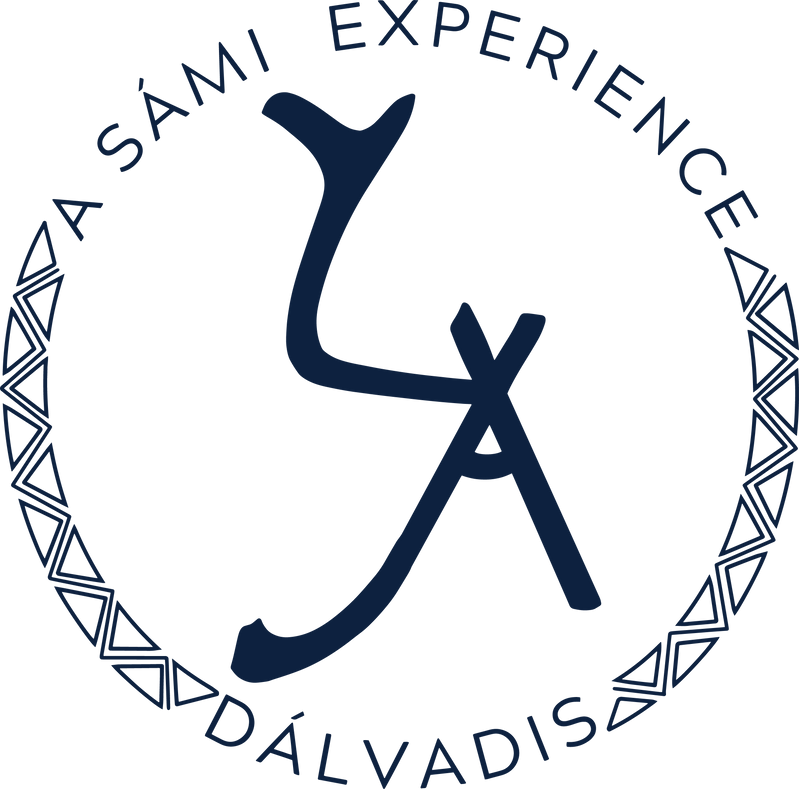
Dalvadis
Welcome to Dalvadis Sami Experience – discover the authentic Sami culture up close!
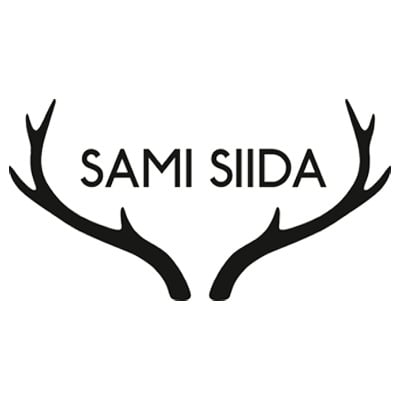
Sami Siida
Sami Siida is a cultural and community center dedicated to promoting Sami culture, language, and traditions. Located in the heart of the Sami homeland, Alta, it serves as a hub for both locals and visitors interested in learning about the rich heritage of the Sami people. The center offers various programs, workshops, and events that showcase traditional Sami crafts, music, and storytelling. It also provides educational resources, fostering a greater understanding of the Sami way of life and their connection to the land.
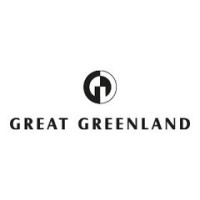

Emma’s Reindeer
Emma’s Reindeer is a company based in the Giellajohka holiday village. My reindeer are family, and their well-being is always a top priority. We offer sleigh rides and cultural experiences that connect guests with the indigenous Sámi way of life.
Our mission is to share and preserve the unique Skolt Sámi culture. Guests learn about duodji (Sámi handicrafts) and their creation. Experiences also teach about reindeer, local nature, history, endangered Sámi languages, and the challenges indigenous peoples face – including climate change.
We aim to raise awareness of Skolt Sámi heritage and share our stories with the world
.
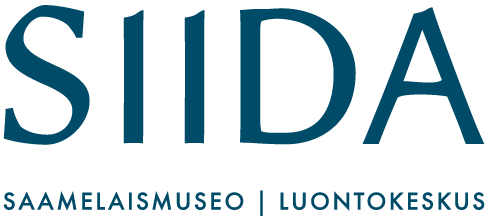
The Sámi Museum Siida
The Sámi Museum Siida is one of the most visited tourist attractions in Northern Lapland. Siida is a national museum of Sámi culture in Finland, whose mission is to preserve Sámi cultural heritage, support cultural self-esteem and strengthen the indigenous people’s own voice in the museum field.
In 2024, Siida was awarded both the European Museum of the Year Award and the Museum of the Year award in Finland. The awards were given in particular for Siida’s community-based work and participatory approach in the renewal process of the main exhibition, in which the Sámi community was actively involved throughout the planning and implementation.
Siida is a museum that has indigenous perspective, expertise and participation at the heart of its work – both in content creation and in public engagement.

SAKK
The Sámi Education Institute (SAKK) provides vocational education and strengthens Sámi languages and Sámi culture in Finland. Located in Inari, the institute supports the livelihoods and cultural heritage of the North. Our tourism students will participate in the EITC 2025 conference as conference assistants, gaining valuable experience in an international event environment. At the same time, they will have the opportunity to learn more about the important theme of the conference: responsible Indigenous tourism.
European Indigenous Tourism Conference EITC 2025
The World Indigenous Tourism Alliance, Sámi Parliament in Finland and University of Lapland organise an international Indigenous tourism conference in Inari, Finland, in May 2025.
The main theme of the conference is ethically sustainable Indigenous tourism. The conference focuses on tourism in the European Arctic.
The conference is organised with the support of the funding granted by the Finnish Ministry of Education and Culture.
Sustainable Indigenous Tourism in the Nordic Arctic
The project strengthens sustainable Indigenous tourism development in the Nordic Arctic through networking and co-operation between Indigenous tourism entrepreneurs in Finland, Greenland, Norway, Sweden and other countries, the Sámi Parliaments in Finland, Norway and Sweden, universities, destination management organisations and the World Indigenous Tourism Alliance. The project activities take place in the frame of the European Indigenous Tourism Conference EITC 2025 in Inari, Finland in May 2025.
The project goal is to strengthen sustainable Indigenous tourism development in the Nordic Arctic by:
- building and strengthening cross-Arctic collaborative knowledge co-creation and capacity building
- supporting the local destination management organisations and private entrepreneurs in their strategic goals regarding sustainable business solutions
The project is funded by the Nordic Council of Ministers’ Arctic Cooperation Programme.
Project partners
“On May 1st, a calf in the snow.”
An old saying in Lapland that describes when reindeer calves should be born.

In the picture, a reindeer is alone with her calf in the place she comes to every year to give birth to her calves.
How the world has changed compared with the calving times of years past! What will happen if reindeer calves are not born in the snow?
In Lapland, nature is very sensitive, and with this artwork I want to illustrate how rapidly the world is changing, and that animals such as the reindeer simply have to adapt. We perhaps do not fully understand the sensitivity of nature and how even small things have a big impact. The reindeer nevertheless lives and acts as it has done for centuries. But what happens when the world around it changes too rapidly?
– Ellen Maarit Juuso, graphic designer
